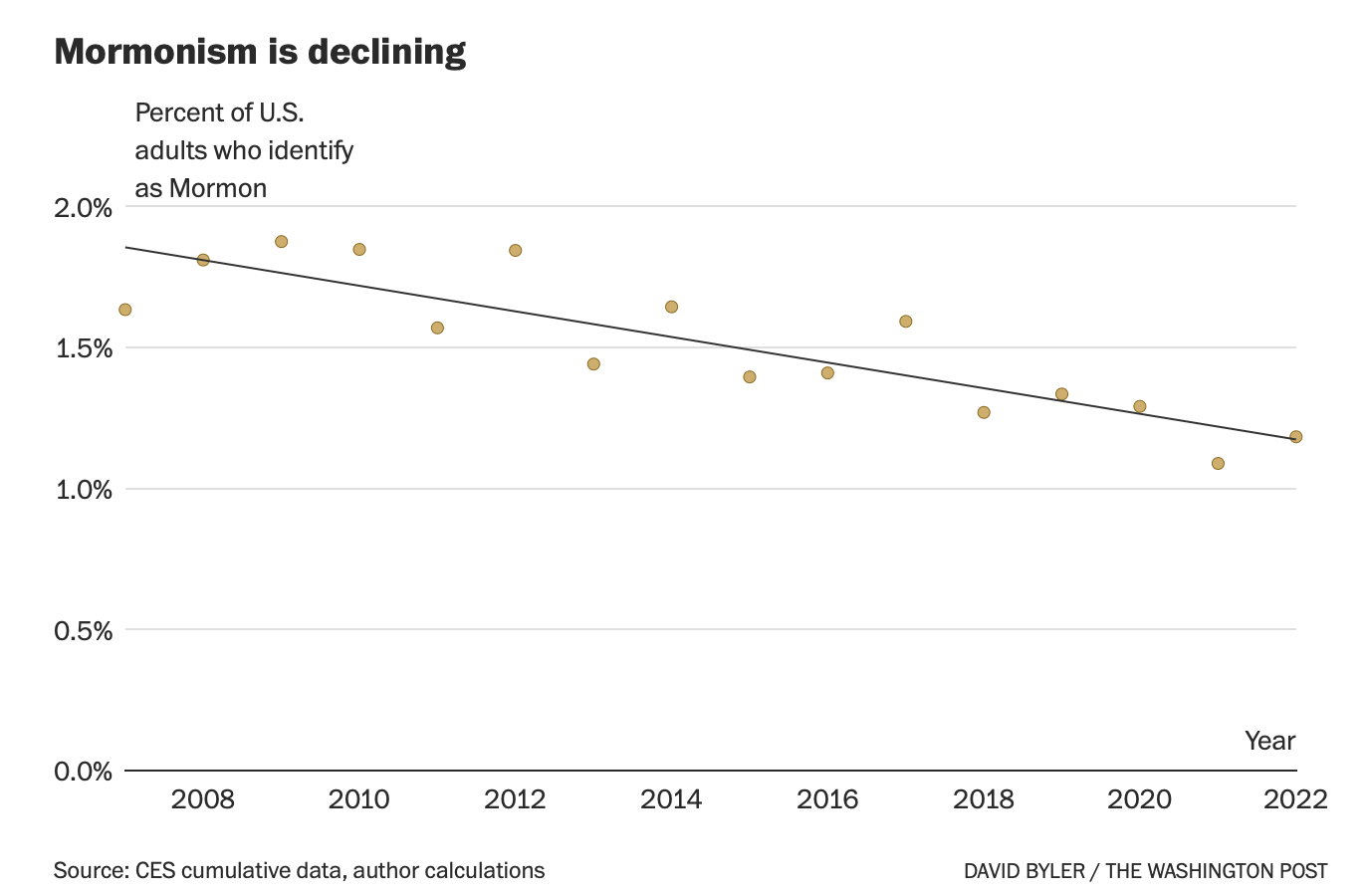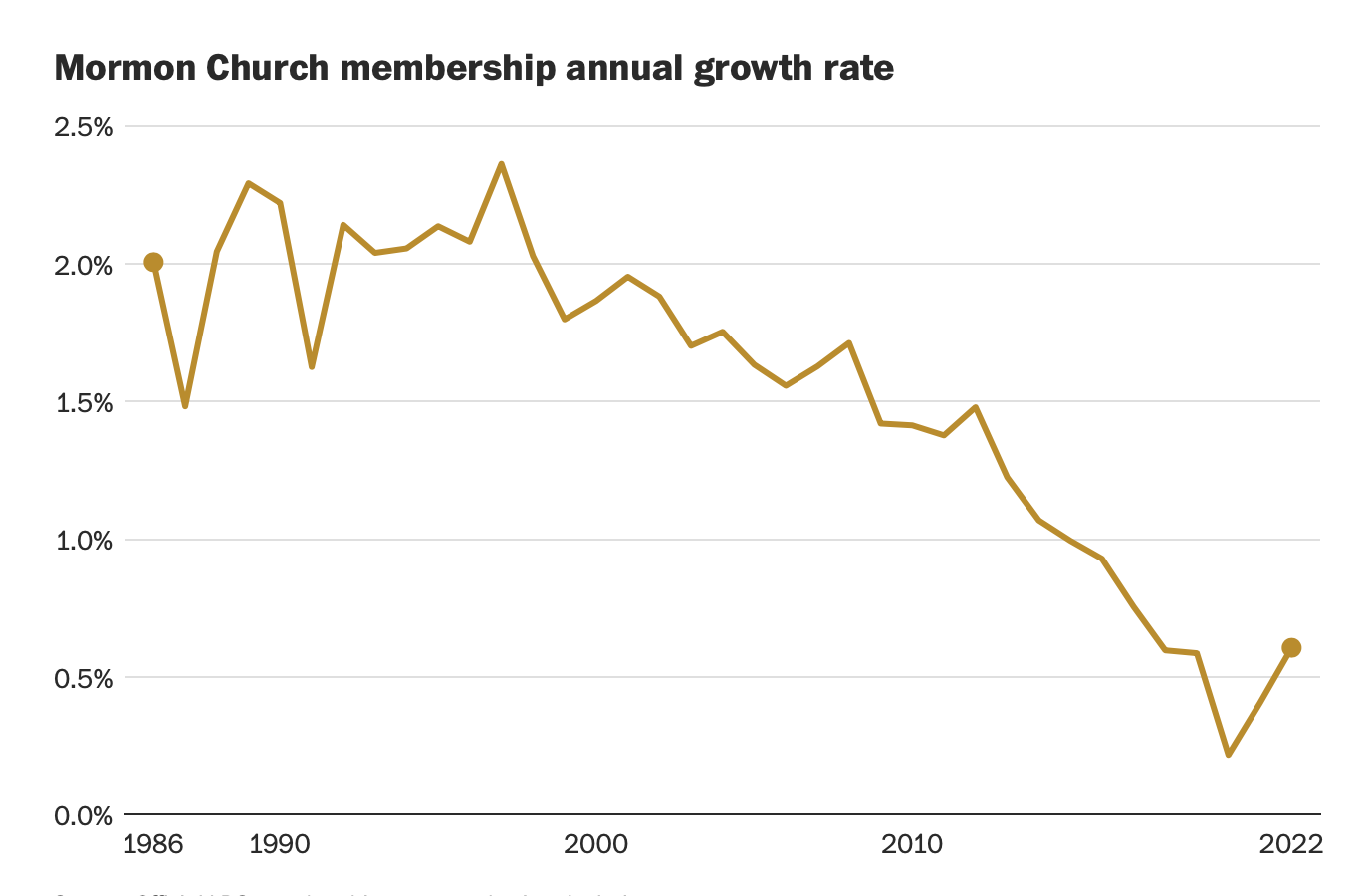Republicans often find themselves on the losing end of demographic shifts as the United States grows more racially diverse, better-educated and less religious. Only one long-term trend — the rapid growth of the reliably conservative Mormon Church — has consistently provided the GOP with good news.
But that consolation might be slipping away. Mormonism is in decline, and Democrats are gaining traction with younger church members. There are no easy solutions for the church or the GOP.
The Church of Jesus Christ of the Latter-day Saints has long been laser-focused on growth. Mormons often spend two to three years of their young adulthood as full-time missionaries in an effort to convert people across the nation and globe. And when missionaries come home, LDS culture encourages them to settle down quickly and raise large families.
Despite these efforts, the American Mormon Church is shrinking.
According to the Cooperative Elections Study — a long-running survey with enough respondents to reliably track Mormon affiliation — 1.8 percent of American adults identified as Mormon in 2007. In 15 years, that total dropped to 1.2 percent. In raw terms, that’s a net loss of roughly 1 million adult members.
The LDS Church maintains a more detailed count, but it might overestimate its strength. Its records include children and “inactive” members, some of whom are former Mormons who skipped the bureaucratic chore of removing their names from the church’s rolls. The church’s count shows positive — but rapidly decelerating — growth.
The LDS Church isn’t unique in its struggles. Americans increasingly distrust organized religion — and organizations of all kinds, for that matter. That feeling of alienation is driving Americans away from other Christian sects as well.
But the LDS Church is also losing some of its distinctive strengths. Mormons are well-known for having large families (and they still do have more children than Americans from other faith traditions), but recent survey data show that’s changing:
Meanwhile, the church’s close alliance with the GOP might be costing it members. As Notre Dame political science professor David Campbell, who was raised Mormon, told me, “There’s an allergic reaction among many Americans — particularly those who lean to the left politically — when religion and politics mix. We see it among Catholics. We see it among evangelicals. And we’re seeing it among Mormons.”
The Mormon Church has tried to solve its problems by trying to redouble its missionary efforts and reducing the length of its Sunday services from three hours to two. It also recently told members to consider each candidate’s character and positions rather than vote straight-ticket, a not-so-subtle signal that the church wants Democrats in the pews, too. As a result, the church is in better shape than some other Christian groups, but that hasn’t been enough to reverse its decline.
That’s a big problem for the GOP. And worse, as Eastern Illinois University political scientist Ryan Burge notes, while older Mormons are reliably Republican, their younger peers are increasingly flirting with Democrats.
Republicans might regain some ground with young Mormons when former president Donald Trump departs the political stage. Trump turned off many LDS voters with his uncouth personal style, constant feuds with Mormon Sen. Mitt Romney of Utah and attempts to restrict Muslim immigration. (Mormons faced religious discrimination throughout U.S. history and tend to react negatively to attacks on any single religious group.)
But Trump’s exit — whether that comes in 2024, 2028 or later — might not heal all wounds. Burge calculated that Mormons younger than 40 were more likely to favor abortion “for any reason” than their older peers. I found similar patterns on other foundational political questions, such as whether White Americans have advantages due to their skin color.
None of this data signals doom for the Republican Party. Since Mormons make up a small portion of the country, Republicans could recoup lost LDS votes with converts from the other 98 percent of the population.
But a struggling — and increasingly bipartisan — LDS Church is a headache for the GOP. In every election, the Republicans have to invent new ways to keep up with the nation’s increasing racial diversity, growing suburbanization and decreasing religiosity. A changing Mormon Church adds one more problem to their plate.
https://www.washingtonpost.com/opinions/2023/07/03/republican-party-mormon-church-decline/


